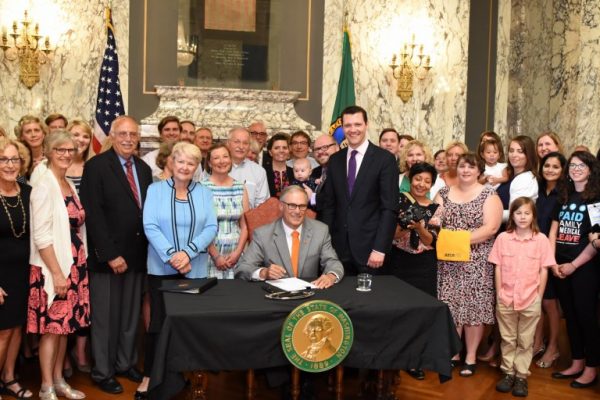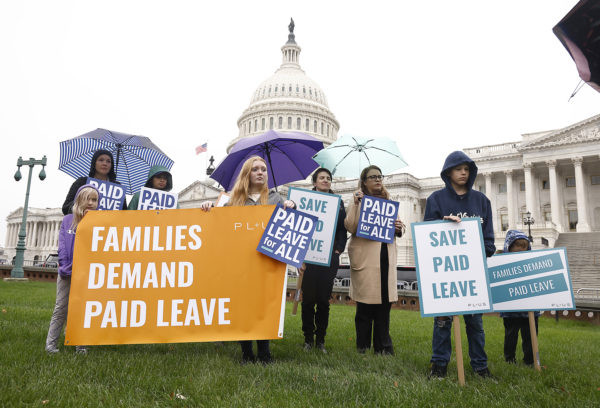February marks the 30th anniversary of the federal Family and Medical Leave Act (FMLA) of 1993— the first bill President Clinton signed into law. FMLA is a lifesaver for millions of families across the country. Nearly 15 million workers take this leave every year to care for newborns, seriously ill family members, or themselves, without fearing losing their jobs. But the 12 weeks of unpaid leave this policy provides is inadequate for workers. While FMLA has been touted as a critical benefit for working families, its lack of wage replacement fails to adequately support many of those families when they need it most.
FMLA’s strict work requirements put the benefit out of reach for millions of workers.
To be eligible for FMLA, employees must remain at the same company for one year, work for companies with 50+ employees, and have clocked 1250 hours the previous year. This leaves 44% of workers without job protection in times of crisis. It’s time we update FMLA so this benefit finally provides workers with the financial security they deserve in times of hardship.
In 1993, FMLA was a huge step forward for parents and families, but since its passage, our country’s work-life policies have quickly fallen behind the rest of the world. Today, according to the Pew Research Center, the U.S. is the only industrialized country without a paid leave program and ranks last in government-sponsored paid leave. To fill the gaps in our country’s insufficient federal policy, over 12 states have created and implemented their own paid leave programs. These states recognize that paid leave is good for businesses and workers. The benefit even stands to improve the health of our economy, as noted by 17 Nobel prize winning economists who agree that paid leave programs will curb long-term inflation.
 In 2017, Washington State became the 5th in the country to pass a paid family and medical leave policy. Since launching the program in 2020, the benefit has become so popular with workers that the state legislature has had to redesign the premium formula to ensure its longevity and stability. Washington’s program provides 12 weeks of leave, which can be extended to between 16-18 weeks under certain circumstances. The program is paid through premiums shared by both employees and employers. In 2022 Washington’s paid family and medical program paid out over $1 billion in benefits to working Washingtonians, ensuring that people across the state could take necessary leave from work to care for themselves and their loved ones in times of need.
In 2017, Washington State became the 5th in the country to pass a paid family and medical leave policy. Since launching the program in 2020, the benefit has become so popular with workers that the state legislature has had to redesign the premium formula to ensure its longevity and stability. Washington’s program provides 12 weeks of leave, which can be extended to between 16-18 weeks under certain circumstances. The program is paid through premiums shared by both employees and employers. In 2022 Washington’s paid family and medical program paid out over $1 billion in benefits to working Washingtonians, ensuring that people across the state could take necessary leave from work to care for themselves and their loved ones in times of need.
Congress has made numerous attempts to expand FMLA, only to be thwarted by big business and anti-social policy legislators.
The latest effort was President Biden’s Build Back Better proposal which includes four weeks of paid family and medical leave and requires that the program include job protection and is available to all working people. Paid leave advocates fighting for a federal policy face an uphill climb since Congress cannot even agree on a meager four weeks of paid leave, which is not even close to the 12 weeks some state offer and the 12 months many countries in the rest of the world offer.
It has been 30 years since Congress passed its last leave policy – our country is long overdue for a national paid leave program that represents America’s values. A program that includes no less than 12 weeks of paid leave, has an extended family definition, and ensures job protection.
Without paid family and medical leave, everyone loses.
According to the Center for American Progress, workers and their families lose $22.5 billion in wages per year without paid family and medical leave. Worse, women cannot get ahead without this crucial benefit. Paid leave is estimated to increase a woman’s workforce participation, especially for birthing parents wanting to return to work. Paid leave is also good for business, decreasing turnover and improving job satisfaction. American Progress reports that small business overwhelmingly supports a national paid leave program because it is affordable, reduces costs, and increases competitiveness.
 A national paid family and medical leave program doesn’t have to be complicated or costly. There is proof of efficacy in twelve states across America. We cannot continue allowing a mainly white male-dominated Congress to block this popular policy and prioritize corporate profits over the well-being of America’s families. It is long past time the United States catches up with the rest of the world and does right by working people by finally passing a comprehensive paid leave policy for all.
A national paid family and medical leave program doesn’t have to be complicated or costly. There is proof of efficacy in twelve states across America. We cannot continue allowing a mainly white male-dominated Congress to block this popular policy and prioritize corporate profits over the well-being of America’s families. It is long past time the United States catches up with the rest of the world and does right by working people by finally passing a comprehensive paid leave policy for all.
More To Read
May 19, 2025
A year of reflections, a path forward
Read EOI Executive Director's 2025 Changemaker Dinner speech
March 24, 2025
Remembering former Washington State House Speaker Frank Chopp
Rep. Chopp was Washington state’s longest-serving Speaker of the House
February 11, 2025
The rising cost of health care is unsustainable and out of control
We have solutions that put people over profits
